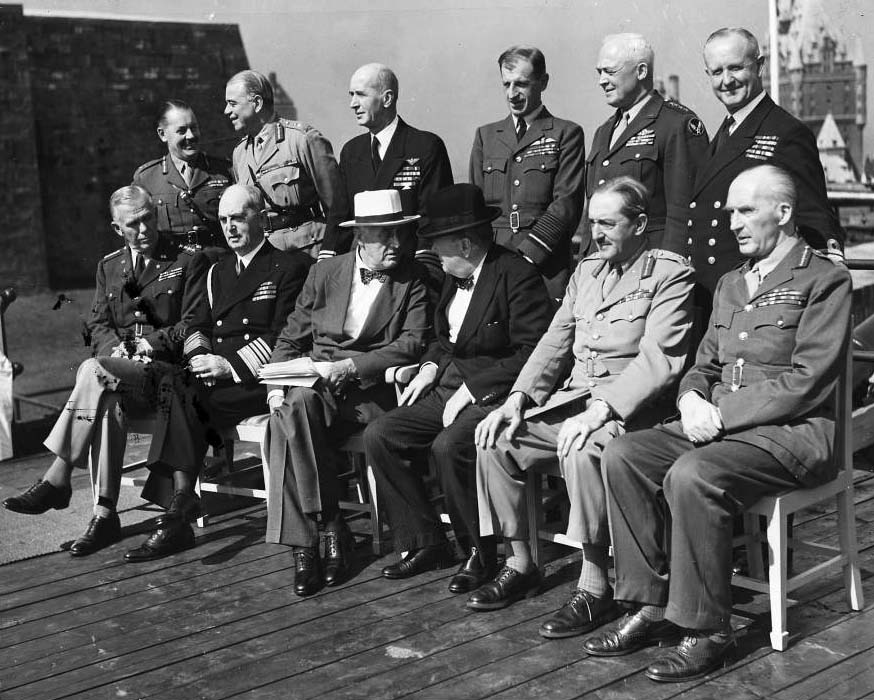
The CCS at OCTAGON.
Back row, left to right:
Maj-Gen Leslie C. Hollis (Senior Assistant Secretary) :
Gen Hastings L. Ismay (Deputy Secretary) :
ADM Ernest J. King (CNO)
Mshl of the RAF Sir Charles F. A. Portal (CAS) :
GEN Henry H. Arnold (CG USAAF) :
Sir Andrew B. Cunningham (1SL/CNS)
Front row, left to right: GEN George C. Marshall, Jr. (CSA)
FADM William D. Leahy (CJCS)
Pres. Franklin D. Roosevelt (D-NY)
PM the Rt. Hon. Winston L. Spencer-Churchill (CP)
FM Sir Alan F. Brooke (CGS)
FM Sir John G. Dill (Chief of British Joint Staff Mission)
This copy of the “Control of Strategic Bomber Forces in Europe” has been taken from:
Combined Chiefs of Staff, “Control of Strategic Bomber Forces in Europe, CCS 520/6,” OCTAGON Conference – September 1944 (Washington, DC: Office of the Combined Chiefs of Staff, 1944): 50-51.
These papers have been reproduced as originally written, with spelling corrections and editorial additions highlighted and bracketed in blue. Referenced charts and maps are located at the bottom of the page. If you find any errors in my transcription, please do not hesitate to contact me.
CONTROL OF STRATEGIC BOMBER FORCES IN EUROPE
DIRECTIVE
Subject: Control of the Strategic Bomber Forces in Europe
To : Deputy Chief of the Air Staff [AVM Sir Norman H. Bottomley]
Commanding General, United States Strategic Air Forces in Europe [LTG Carl A. Spaatz]
From: Chief of the Air Staff [Mshl of the RAF Sir Charles F. A. Portal]
Commanding General, United States Army Air Forces [GEN Henry H. Arnold]
1. The Combined Chiefs of Staff have decided that executive responsibility for the control of the strategic bomber forces in Europe shall be vested in the Chief of the Air Staff, RAF and the Commanding General, United States Army Air Forces, jointly.
2. The Deputy Chief of the Air Staff, RAF and the Commanding General, United States Strategic Air Forces in Europe, are designated as representatives of the Chief of the Air Staff, RAF and the Commanding General, United States Army Air Forces, respectively, for the purpose of providing control and local coordination through consultation.
3. The over-all mission of the strategic air forces is the progressive destruction and dislocation of the German military, industrial and economic
systems and the direct support of land and naval forces.
4. Under this general mission you are to direct your attacks, subject to the exigencies of weather and tactical feasibility, against the systems of objectives and in the order of priority now established by the Supreme Commander, Allied Expeditionary Force [GEN Dwight D. Eisenhower]. When you decide that changes in objectives or priorities are necessary, you will issue the necessary directives and inform the Chief of the Air Staff, RAF and the Commanding General, United States Army Air Forces.
5. Objectives other than those covered in paragraph 4 above will be attacked in accordance with the following:
-50-
a. Counter air force action. As the result of air action against the production, maintenance and operation facilities of the German Air Forces (G.A.F.), its fighting effectiveness has now been substantially reduced. At the same time our combined air strength has been vastly increased. In these circumstances we are no longer justified in regarding the G.A.F. and its supporting industry as a primary objective for attack. Our major effort must now be focused directly upon the vital sources of Germany’s war economy. To this end policing attacks against the G.A.F. are to be adjusted so as to maintain tactical conditions which will permit of the maximum impact upon the primary objectives. No fixed priority is, therefore, assigned to policing attacks against the G.A.F. The intensity of such attacks will be regulated by the tactical situation existing.
b. Direct support. The direct support of land and naval operations remains a continuing commitment upon your forces. Upon call from the supreme commanders concerned either for assistance in the battle or to take advantage of related opportunities, you will meet their requirements promptly.
c. Important industrial areas. When weather or tactical conditions are unsuitable for operations against specific primary objectives attacks should be delivered upon important industrial areas by both Bomber Command RAF and [USSTAF] (using blind bombing technique as necessary) [i.e., radar].
d. S.O.E. [Special Operations Executive] operations. All SOE/OSS [Office of Strategic Services] operations undertaken by units of RAF Bomber Command and United States Strategic Air Forces in Europe will be in accordance with the requirements of the Supreme Allied Commanders, who will issue the requisite orders from time to time, under existing procedure.
e. Attacks in support of the Russian armies. Attacks in support of operations by the Russian armies should be delivered as prescribed from time to time by the Combined Chiefs of Staff.
f. Fleeting targets. There may be certain other targets of great but fleeting importance for the attack of which all necessary plans and preparations should be made. Of these an example would be the important units of the German Fleet in harbor or at sea.
6. You are responsible that the operations of the strategic air forces are coordinated with the operations of the tactical air forces in the theaters.
-51-
